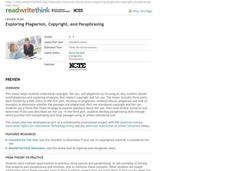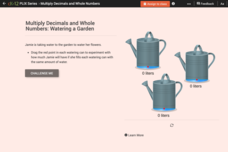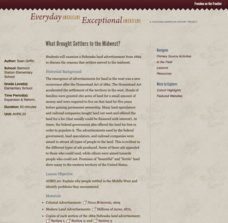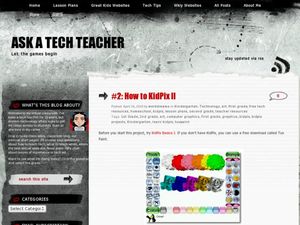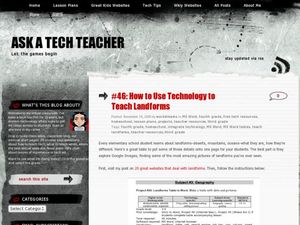Roy Rosenzweig Center for History and New Media
Analyzing Political Campaign Commercials
Imagine a lesson that models for learners how to separate facts from opinions. How to detect bias. How to evaluate a source of information. How to identify propaganda. Although designed for middle schoolers, the activities in this packet...
Roy Rosenzweig Center for History and New Media
Yankee Doodle: How Has It Changed over Time?
Grab your feathers and your hat! And perhaps some macaroni! It's time to investigate the evolution of "Yankee Doodle Dandy." Groups do a close reading of sheet music covers, lyrics, and even YouTube videos to see how this political song...
Echoes & Reflections
The Children and Legacies Beyond the Holocaust
Using video testimony, primary source documents that detail international agreements, and structured discussions, learners consider the precarious position of children during the Holocaust and other international conflicts, and how to...
ReadWriteThink
Exploring Plagiarism, Copyright, and Paraphrasing
Plagiarism, copyright, and fair use are the focus of a three-part instructional activity designed to inform scholars of how to properly cite others' work. First, pupils use a KWL chart to begin thinking and discussing plagiarism. They...
CK-12 Foundation
Fraction Rounding to the Nearest Half: Beaker Math
Rounding fractions is the focus of a six-question interactive designed to boost concept proficiency. A measured beaker's water level increases and decreases as mathematicians move the tool to represent specific fractions. Questions...
CK-12 Foundation
Estimation to Check Decimal Multiplication: Watering a Garden
Mathematicians solve six multiple-choice and true or false questions using their knowledge of estimation and multiplying decimals. The interactive provides a garden-themed tool that creates a visual aid of three watering cans to assist...
CK-12 Foundation
Values Written as Powers: Binary Numbers 9 to 16
Challenge mathematicians to crack the binary code with an interactive that focuses on numbers nine to 16. A table reveals exponential equations to aid in answering multiple-choice questions. A discussion question gauges comprehension.
Curated OER
Blogging to Create a Community of Writers
One of the keys for successful teaching is connecting curriculum to real-life experiences. This instructional activity on blogging does this, by making writing, revising, and publishing a reality. Pupils create a character for a story,...
Curated OER
Lesson Learned: Creating a Life Reports Project
Tap into the wisdom and knowledge of older members of the community with this New York Times plan. To warm up, learners write about and discuss advice they have been given. After reading "The Life Report," an op-ed column that asks older...
The New York Times
I Don’t Think So: Writing Effective Counterarguments
When it comes to writing effective arguments, writers must do more than simply make a claim, counterarguments must be considered. Aspiring writers analyze counterarguments in editorials, and then learn how to write counterarguments in...
Civil War Trust
Civil War Personalities Lesson Plan
Caring, trustworthiness, and responsibility—these are only a few character traits in focus of a lesson based on stories from the Civil War era. Class members explore several influential lives while reading biographies that highlight...
Curated OER
Windmills and Blogs: The Impact of Technology in Rural Peru
How does technology affect a community? Research the benefits and consequences of technology in rural Peru. For this technology lesson, learners discuss how the effects of technology. They view a PowerPoint and learn about the Peace...
Curated OER
What We Eat, Where We Sleep: Documenting Daily Life to Tell Stories
This is not just a New York Time article to read, this is a set of amazing activity ideas all related to the slide shows "Breaking Bread Everywhere" and "Where Children Sleep." Your class can view each show, read about what they mean...
EngageNY
Notices, Wonders, and Vocabulary of the Third Stanza of “If”
How does one's experience reading a poem's text differ from listening to its audio version? Delve into the insightful question with the poem, If by Rudyard Kipling, as pupils compare and contrast their experience using a note-taking...
Echoes & Reflections
Perpetrators, Collaborators, and Bystanders
After the Holocaust, the world grappled with how to bring justice to the Nazis. But what to do with the thousands—if not millions—who allowed it to happen? Young historians consider the issues of guilt, collaboration, and responsibility...
EngageNY
Planning for Writing: Introduction and Conclusion of a Literary Argument Essay
After completing three body paragraphs of an argument essay about life's rules to live by from Bud, Not Buddy Christopher Paul Curtis, it's time to begin writing the introduction and conclusion. Independently, pupils draft the final two...
EngageNY
Introducing Research Folders and Generating a Research Question
Take the next step in the writing process with a lesson plan geared towards the completion of writing an evidence-based essay about a rule to live by, as Bud did in Bud, Not Buddy by Christopher Paul Curtis. Pupils collaborate with their...
Roy Rosenzweig Center for History and New Media
What Brought Settlers to the Midwest?
Drawn by promises of fertile land, thousands of settlers poured West because of the Homestead Act of 1862. By examining images of the ads that drew them westward, learners consider the motivations for movement. They also consider how the...
Curated OER
How To KidPix II
Learners practice using KidPix to create illustrations. In this visual arts activity, students define key vocabulary words, such as "palette" and "toolbar" to familiarize themselves with the KidPix program. Learners create several...
Curated OER
How to Use Technology to Teach Landforms
Students create a landform table on the computer. In this geography lesson, students use Microsoft Word to design a 3 column table. They list different landforms, examples, and attach a picture of each.
Novelinks
Words by Heart: Level 3 Writing Assignment
Get in touch with the emotional side of writing by reading Words By Heart. The writing assignment helps learners make personal connections with the text and hone their writing skills by exploring a time that they had to forgive or be...
CK-12 Foundation
Proportions to Find Percents: Bag of Candy
Proportions and percents are the focus of an interactive designed to boost math proficiency. Five questions challenge participants to solve candy-themed word problems. A color-coded tool with moveable parts assists mathematicians in the...
CK-12 Foundation
Values Written as Powers: Binary Numbers 17 to 24
Boost mathematicians' proficiency of binary numbers 17 to 24 with an interactive comprised of six questions—multiple-choice, true or false, and a discussion. A color-coded table reveals binary equivalents to aid in the problem-solving...
Alabama Department of Archives and History
Strange Fruit: Lynching in America
To continue their study of the Civil War, Reconstruction, and the beginning of the civil rights movement, class members watch the YouTube video of Billie Holiday singing "Strange Fruit" as an introduction to an examination of lynching in...





